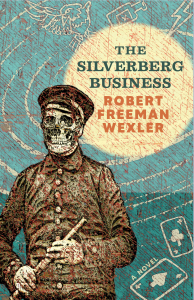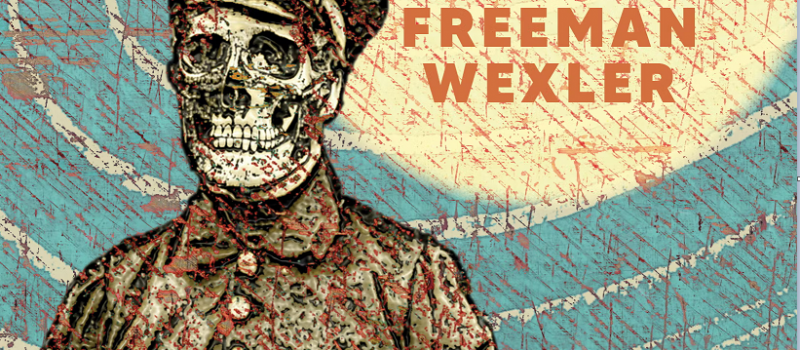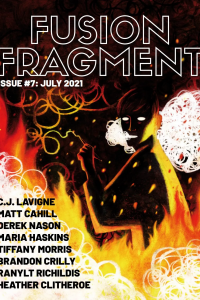Gary K. Wolfe Reviews The Silverberg Business by Robert Freeman Wexler
 The Silverberg Business, Robert Freeman Wexler (Small Beer 978-1-61873-201-9, $17.00, 271pp, tp) August 2022.
The Silverberg Business, Robert Freeman Wexler (Small Beer 978-1-61873-201-9, $17.00, 271pp, tp) August 2022.
Probably the first thing SFF readers need to know about Robert Freeman Wexler’s The Silverberg Business is that it has nothing to do with any legendary grand masters of the field. Instead, it’s one of the mostly deeply weird novels I’ve read in some time, at times hallucinatory and dreamlike, at other times gritty and naturalistic. We’ve heard a lot in the past several years about genre-blending or “cross-genre” fiction, but Wexler starts out by combining two genres that seldom come up in these discussions: the western and the hard-boiled private eye mystery. The narrator, who goes by the name of Shannon and sometimes passes himself off as Irish (though his original Jewish family was Chanun, changed by immigration authorities), is an operative for a Chicago detective agency, sent to Victoria TX in 1888 to find out what had happened to a man named Silverberg, who had been entrusted with funds to develop a haven for Romanian Jewish refugees. Of course, both Silverberg and the money have disappeared, and it doesn’t take Shannon long to surmise that he’s likely been swindled and murdered. It’s clear early on that Shannon is not only a crack investigator, but that he can turn into Sam Spade when he needs to. “I like to know things,” he tells one potential witness. “That means you’re going to talk. That’ll make us friends. You want to be friends?”
While Shannon isn’t confronted with the instant hostility that usually greets outsiders in a town with dark secrets, he repeatedly glimpses a sinister figure with bone-white hair who seems to be watching him – and when he zeroes in on a white-haired gambler named Stephens as a leading suspect, he starts assembling clues in classic private-eye fashion. After figuring out a likely path that Silverberg’s murderers might have taken, Shannon finds himself in a stark wasteland characterized by unnatural sand hills, and things really begin to go sideways. After a confrontation with a local homesteader named Conroy, whose desert shack somehow leads into a huge mansion, he makes his way to a saloon in which everyone except the bartender is skull-headed, even though the rest of their bodies seem normal. After joining a poker game that seems to have been going on indefinitely – “the skull-heads are actors on a stage, doomed to perpetual repetition of the same scene,” he muses – Shannon persuades the bartender, a man named Charles Dellschau (an actual outsider artist of the period who seemed obsessed with drawing fanciful airships) to help him escape in Dellschau’s “air machine.”
Shannon eventually makes his way back to Victoria, which is now different in subtle ways; a laundress he met only days earlier has been replaced by a couple who have never heard of her, for example. We begin to suspect that Stephens has access to some sort of apocalyptic secret powers, while Shannon himself – who is far from finished with those poker-playing skullheads – finds unexpected assistance from helpers in the form of an eagle and a goat. The whole surreal landscape surrounding Victoria begins to take on the genuinely nightmarish aspect of a cross between Lovecraft’s Innsmouth (Stephens is repeatedly associated with smells of rotting fish and brackish water) and Cormac McCarthy’s Blood Meridian, with even some nods to William James along the way. (A group of giants outside a saloon get into a surprisingly scholastic debate about free will, which is later echoed by a skull-faced woman in that weird saloon). And while that purgatorial poker game deserves to join other literary poker games with supernatural stakes, from Edward Whittemore to Tim Powers, at times Wexler’s attention to detail can be trying; he tells us every card dealt to every player during an extended session of five-card stud. Shannon’s fate and freedom may depend on the outcome, but so did my patience. Fortunately, it’s a minor quibble in a truly strange and unique novel that manages to touch upon a surprising number of issues while expanding the stakes to almost epic scope in its final chapters, which by the end even manage to invoke the deadliest hurricane ever to strike the US. As bizarre as Wexler’s landscapes may be, they’re populated by characters of genuine resonance, from Shannon himself to that mysterious skull-faced saloon lady and even the lead poker player Ring Hand, who emerges as a tragic figure despite his inability to speak in more than barks and growls. But like those hellish landscapes and that weird saloon, I expect these folks, trapped in their own dark realities, will haunt me for some time to come.
Gary K. Wolfe is Emeritus Professor of Humanities at Roosevelt University and a reviewer for Locus magazine since 1991. His reviews have been collected in Soundings (BSFA Award 2006; Hugo nominee), Bearings (Hugo nominee 2011), and Sightings (2011), and his Evaporating Genres: Essays on Fantastic Literature (Wesleyan) received the Locus Award in 2012. Earlier books include The Known and the Unknown: The Iconography of Science Fiction (Eaton Award, 1981), Harlan Ellison: The Edge of Forever (with Ellen Weil, 2002), and David Lindsay (1982). For the Library of America, he edited American Science Fiction: Nine Classic Novels of the 1950s in 2012, with a similar set for the 1960s forthcoming. He has received the Pilgrim Award from the Science Fiction Research Association, the Distinguished Scholarship Award from the International Association for the Fantastic in the Arts, and a Special World Fantasy Award for criticism. His 24-lecture series How Great Science Fiction Works appeared from The Great Courses in 2016. He has received six Hugo nominations, two for his reviews collections and four for The Coode Street Podcast, which he has co-hosted with Jonathan Strahan for more than 300 episodes. He lives in Chicago.
This review and more like it in the August 2022 issue of Locus.
 While you are here, please take a moment to support Locus with a one-time or recurring donation. We rely on reader donations to keep the magazine and site going, and would like to keep the site paywall free, but WE NEED YOUR FINANCIAL SUPPORT to continue quality coverage of the science fiction and fantasy field.
While you are here, please take a moment to support Locus with a one-time or recurring donation. We rely on reader donations to keep the magazine and site going, and would like to keep the site paywall free, but WE NEED YOUR FINANCIAL SUPPORT to continue quality coverage of the science fiction and fantasy field.
©Locus Magazine. Copyrighted material may not be republished without permission of LSFF.







